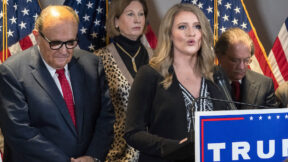Washington Post Editorial Calls For a ‘Reckoning’ in Wake of Hunter Biden Story But Admits No Culpability

The Washington Post published an editorial on Sunday calling for a “reckoning” in the media world after both the New York Times and the Post verified additional details in the ongoing Hunter Biden laptop saga.
The editorial begins by highlighting new reporting from the Post on Hunter Biden:
The Post reported Wednesday on the multimillion-dollar deals the president’s son made with a Chinese energy company. The investigation adds new details and confirms old ones about the ways in which Joe Biden’s family has profited from trading overseas on his name — something for which the president deserves criticism for tacitly condoning.
The editorial notes, however, that recent Post reporting on Hunter Biden’s scandals “does not, despite some conservatives’ insistence otherwise, prove that President Biden acted corruptly.”
“For now, what’s more compelling than the assorted accusations about the Bidens’ behavior is this question: Why is confirmation of a story that first surfaced in the fall of 2020 emerging only now?” explains the editorial, referencing the recent confirmations of the story in both the Post and the Times.
“When the New York Post published its blockbuster exclusive on the contents of a laptop said to have been abandoned at a Delaware repair shop by Hunter Biden, mainstream media organizations balked at running with the same narrative,” the editorial explains, later noting “it makes obvious sense for newspapers to wait to verify information before turning it into a story.”
Miranda Devine, who broke the original New York Post story, immediately responded to the editorial calling it “bizarre” and taking issue with the idea that conservatives were trying to prove Biden’s corruption.
Bizarre WaPo editorial, declaring of its own “investigation”: “What it does not do, despite some conservatives’ insistence otherwise, is prove that Pres. Biden acted corruptly” No conservative ever insisted they had done anything but try to exonerate Biden https://t.co/1H4eoRooL1
— Miranda Devine (@mirandadevine) April 3, 2022
“Social media sites displayed even greater caution,” the editorial says of the original Hunter Biden story, noting that “Twitter blocked the story altogether, pointing to a policy against hacked materials, and suspended the New York Post’s account for sharing it; Facebook downranked the story in the algorithms that govern users’ news feeds for fear that it was based on misinformation.”
The editorial goes on to note the immense backlash against Twitter and “Big Tech” from the American right and concedes that the story’s treatment fostered “allegations of a coverup, or at best a double standard in the treatment of conservative and liberal politicians by mainstream media and social media sites.”
The editorial then explains the “case for reluctance” on the part of both social media and mainstream news publications in regards to the New York Post story.
“Both had been the unwitting tools of a Russian influence campaign in 2016, and it was only prudent to suspect a similar plot lay behind the mysterious appearance of a computer stuffed with juicy documents and conveniently handed over to President Donald Trump’s toxic personal attorney, Rudy Giuliani,” the editorial explains, adding that at the time other efforts of Russian disinformation were ongoing, including “doctored recordings supposedly showing Joe Biden improperly pressuring the then-president of Ukraine to aid Hunter Biden’s business interests.”
While explaining why the Post and social media platforms erred on the side of caution in reporting on the New York Post story, the editorial concludes “this context doesn’t necessarily exonerate every action of every publication and platform.”
While admitting no direct culpability, the Post goes on to raise some tough questions for the media and social media in regard to a media environment in which hacks and weaponized information are now the norm.
“The harder conundrum is what to do with true information that comes from a hack, and harder still is how to treat true information that hasn’t been stolen but has been selectively shared to further an agenda,” argues the editorial.
“Social media sites face a tougher choice when it comes to whether and how to dampen the spread of a story when they’re unsure of its truthfulness or origins. None of these dilemmas have easy answers,” the editorial continues.
“The lesson learned from 2020 may well be that there’s also a danger of suppressing accurate and relevant stories,” concludes the editorial of the whole affair.
The editorial received faint praise from Glenn Greenwald, who wrote in response:
The Editorial is filled with self-justifying caveats about why it was reasonable to have gotten the story so wrong. It downplays the full extent of the joint CIA/media/Big Tech lie.
But at least the Post now stands alone in admitting the fraud and that an accounting is due.
The Editorial is filled with self-justifying caveats about why it was reasonable to have gotten the story so wrong. It downplays the full extent of the joint CIA/media/Big Tech lie.
But at least the Post now stands alone in admitting the fraud and that an accounting is due.
— Glenn Greenwald (@ggreenwald) April 3, 2022




